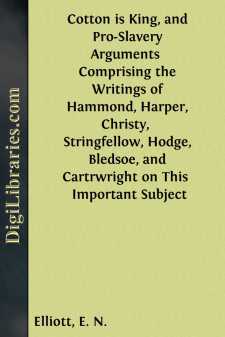Categories
- Antiques & Collectibles 13
- Architecture 36
- Art 48
- Bibles 22
- Biography & Autobiography 813
- Body, Mind & Spirit 142
- Business & Economics 28
- Children's Books 16
- Children's Fiction 13
- Computers 4
- Cooking 94
- Crafts & Hobbies 4
- Drama 346
- Education 46
- Family & Relationships 57
- Fiction 11829
- Games 19
- Gardening 17
- Health & Fitness 34
- History 1377
- House & Home 1
- Humor 147
- Juvenile Fiction 1873
- Juvenile Nonfiction 202
- Language Arts & Disciplines 88
- Law 16
- Literary Collections 686
- Literary Criticism 179
- Mathematics 13
- Medical 41
- Music 40
- Nature 179
- Non-Classifiable 1768
- Performing Arts 7
- Periodicals 1453
- Philosophy 64
- Photography 2
- Poetry 896
- Political Science 203
- Psychology 42
- Reference 154
- Religion 513
- Science 126
- Self-Help 84
- Social Science 81
- Sports & Recreation 34
- Study Aids 3
- Technology & Engineering 59
- Transportation 23
- Travel 463
- True Crime 29
Cotton is King, and Pro-Slavery Arguments Comprising the Writings of Hammond, Harper, Christy, Stringfellow, Hodge, Bledsoe, and Cartrwright on This Important Subject
by: E. N. Elliott
Categories:
Description:
Excerpt
INTRODUCTION.
There is now but one great question dividing the American people, and that, to the great danger of the stability of our government, the concord and harmony of our citizens, and the perpetuation of our liberties, divides us by a geographical line. Hence estrangement, alienation, enmity, have arisen between the North and the South, and those who, from "the times that tried men's souls," have stood shoulder to shoulder in asserting their rights against the world; who, as a band of brothers, had combined to build up this fair fabric of human liberty, are now almost in the act of turning their fratricidal arms against each other's bosoms. All other parties that have existed in our country, were segregated on questions of policy affecting the whole nation and each individual composing it alike; they pervaded every section of the Union, and the acerbity of political strife was softened by the ties of blood, friendship, and neighborhood association. Moreover, these parties were constantly changing, on account of the influence mutually exerted by the members of each; the Federalist of yesterday becomes the Republican of to-day, and Whigs and Democrats change their party allegiance with every change of leaders. If the republicans mismanaged the government, they suffered the consequences alike with the federalists; if the democrats plunged our country into difficulties, they had to abide the penalty as well as the whigs. All parties alike had to suffer the evils, or enjoy the advantages of bad or good government. But it has been reserved to our own times to witness the rise, growth, and prevalence of a party confined exclusively to one section of the Union, whose fundamental principle is opposition to the rights and interests of the other section; and this, too, when those rights are most sacredly guaranteed, and those interests protected, by that compact under which we became a united nation. In a free government like ours, the eclecticism of parties—by which we mean the affinity by which the members of a party unite on questions of national policy, by which all sections of the country are alike affected—has always been considered as highly conducive to the purity and integrity of the government, and one of the causes most promotive of its perpetuity. Such has been the case, not only in our own country, but also in England, from whom we have mainly derived our ideas of civil and religious liberty, and even, to some extent, our form of government. But there, the case of oppressed and down-trodden Ireland, bears witness to the baneful effects of geographical partizan government and legislation.
In our own country this same spirit, which had its origin in the Missouri contest, is now beginning to produce its legitimate fruits: witness the growing distrust with which the people of the North and the South begin to regard each other; the diminution of Southern travel, either for business or pleasure, in the Northern States; the efforts of each section to develop its own resources, so as virtually to render it independent of the other; the enactment of "unfriendly legislation," in several of the States, towards other States of the Union, or their citizens; the contest for the exclusive possession of the territories, the common property of the States; the anarchy and bloodshed in Kansas; the exasperation of parties throughout the Union; the attempt to nullify, by popular clamor, the decision of the supreme tribunal of our country; the existence of the "underground railroad," and of a party in the North organized for the express purpose of robbing the citizens of the Southern States of their property; the almost daily occurrence of fugitive slave mobs; the total insecurity of slave property in the border States; the attempt to circulate incendiary documents among the slaves in the Southern States, and the flooding of the whole country with the most false and malicious misrepresentations of the state of society in the slave States; the attempt to produce division among us, and to array one portion of our citizens in deadly hostility to the other; and finally, the recent attempt to excite, at Harper's Ferry, and throughout the South, an insurrection, and a civil and servile war, with all its attendant horrors....


